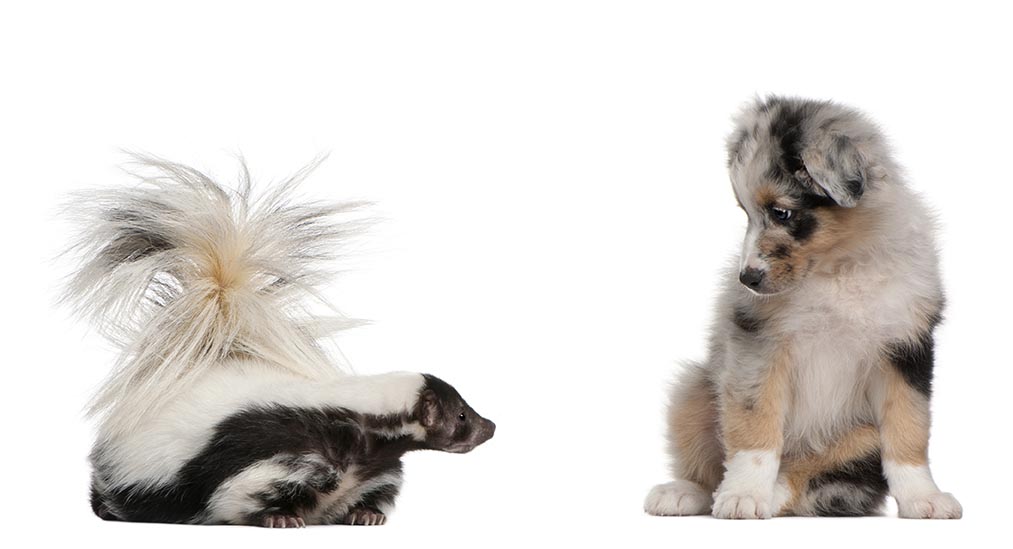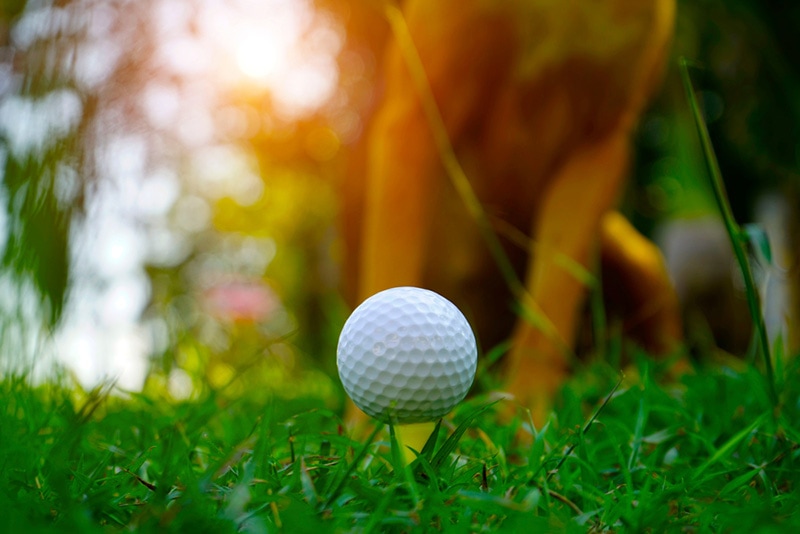How Long Can Rabbits Go Without Food? Vet Answer, Risks & Causes
Updated on
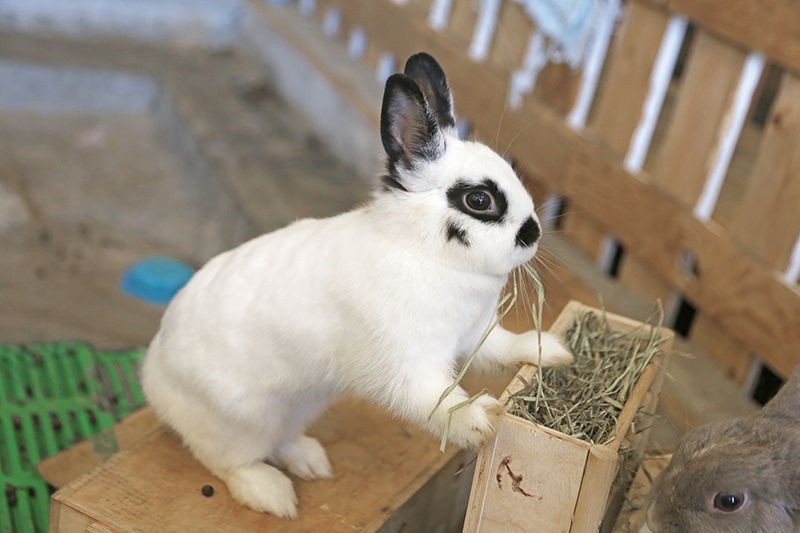
Click to Skip Ahead
Rabbits have sensitive digestive systems and are grazers, so they eat small amounts throughout the whole day. Therefore, they need to have access to food at all times. Their digestive system must constantly be moving, or their risk of serious health problems increases, such as gut stasis.
Rabbits should have access to hay at all times. You should not withhold food from them, not even for a few hours. If you notice your rabbit isn’t eating, you should contact your vet immediately. Rabbits may have a loss of appetite for all sorts of different reasons, and most of them will require prompt treatment from your vet.
The only exception to this might be when your rabbit is at the vet’s clinic and due to have a procedure that involves examination or surgery of their teeth or mouth. In this case, your vet might withhold food for no more than an hour so that they can have a better view of the mouth without food getting in the way.
Furthermore, if you know your rabbit isn’t eating due to stress (such as travel), you may postpone seeing a vet for just a few hours, until the stressful event has passed and they have started eating again. If they have not, get them checked out straight away and try to minimize their stress.
What Happens if a Rabbit Doesn’t Eat for 24 Hours?
If a rabbit doesn’t eat for 24 hours, they will experience several serious health problems, which can be life-threatening. Always take your rabbit to the vet if they have gone without food for more than a few hours, and especially if it has already been 12 hours or more. There are real risks for a rabbit not eating over a whole day. Unlike humans and most other animals, rabbits aren’t designed to go longer between meals.
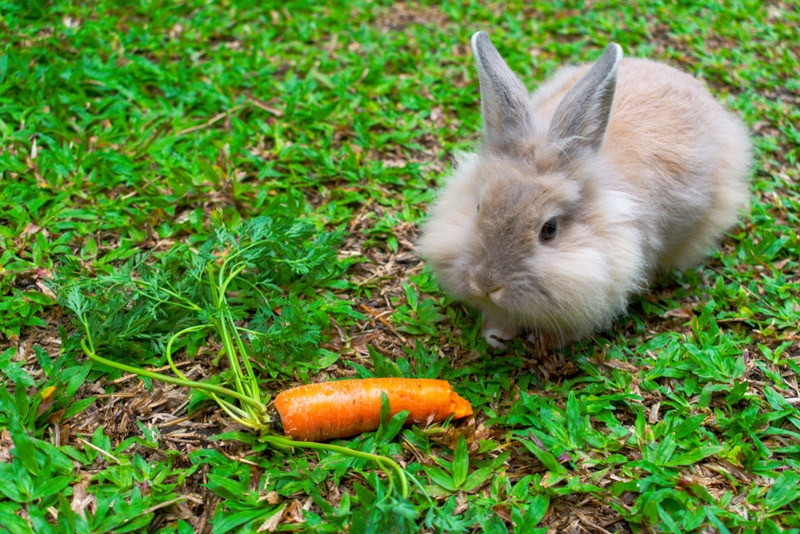
- Gut stasis. Gut stasis occurs when a rabbit’s digestive system slows down or stops moving. This can happen for many reasons, but typically it is because they haven’t eaten anything for hours. When this occurs, gas and abnormal bacteria build up in their digestive system, causing bloating and pain. This condition can cause infections and other complications, some of which can be deadly.
- Dehydration. If a rabbit is not given water or isn’t drinking enough, they can become dehydrated within as little as 12 hours. When this occurs, the rabbit will experience a range of serious complications and health problems, including organ failure and sometimes death.
- Liver problems. A rabbit’s liver is used to a constant flow of food. When they don’t eat for some time, they also stop passing nutritious cecotropes, all of which can cause the liver to produce and build up excess fat, leading to liver disease.
- Weakness. To stay healthy, rabbits need to eat a balanced and nutritious hay-based diet constantly throughout the day. Without food and water, the rabbit will become weak and lethargic, and their organ function will be at risk, which is life-threatening. Any delay in diagnosis and appropriate treatment may make it more difficult for them to recover from their illness.
You should seek veterinary care if your rabbit hasn’t eaten anything for even just a few hours. Even if your rabbit isn’t eating for a benign reason (like the stress of travel), not eating can cause various and often serious complications. Therefore, the sooner you get your rabbit to the vet, the less likely they are to develop any of these problems.
How Long Can Rabbits Survive Without Food?
Rabbits need access to food at all times for maximum health. Never allow your rabbit to run out of fresh food, and if they stop eating for even just a few hours, get them checked out by your vet. It’s unclear how long rabbits could theoretically survive without eating, as this would be a highly unethical and dangerous fact to check. Hospitalized sick rabbits that are having fluid support and are being fed by your vet can sometimes refuse eating hay for a few days, but this is very different from not having any access to food.
Anecdotally, some pet sites state that rabbits might survive a maximum of 2–4 days without food, but this is a serious welfare issue that you should avoid at all costs. It will lead to your rabbit suffering, and they might not recover even with treatment. Here at Hepper, we care deeply about animal welfare, and our mission is to provide you with up-to-date and evidence-based veterinary info so you can care for your rabbit in the best possible way. Leaving your rabbit alone without access to fresh food is beyond dangerous; it will lead to serious illness and suffering for your bunny.
However, if a rabbit goes a couple of days without eating, their risk of complications increases considerably. Even with proper food and treatment, there is no guarantee they will survive. At this point, liver disease, gastrointestinal stasis, and other problems have already occurred—and they are life-threatening.
Simply providing the rabbit with food won’t ensure their survival if they’ve gone hours or days without eating. This should be strictly avoided, as it will seriously impact the rabbit’s welfare and health, causing them to suffer. Therefore, if your rabbit isn’t eating, you should seek veterinary care immediately, especially if it’s already been 12 or more hours. The longer you wait, the more your rabbit’s chances of making a full recovery decrease.

Why Rabbits Need a Constant Supply of Food
A rabbit’s digestive system is designed to process food continuously. They’re grazers, meaning they were made to practically always eat. In the wild, rabbits would spend much of their day grazing on grasses and other vegetation. Pet rabbits need to be provided with the same opportunities.
Unlike humans and other animals, rabbits have a digestive system that helps them extract the maximum nutrition from their food. The most important part of their digestive tract is the cecum, which contains billions of bacteria that break down food and ferment it. This process allows their body to absorb as many nutrients as possible. During the fermentation process, rabbits produce a special kind of feces called cecotropes, which they eat in order to recycle all the crucial nutrients.
If rabbits don’t eat for an extended period, their digestive system may slow down or even stop. It needs a constant supply of food to keep moving. This may lead to a buildup of gas and bacteria, which can cause complications. This condition is called gastrointestinal stasis and is potentially life-threatening. The digestive system may not start again, even after the animal eats.
Therefore, you should provide your rabbit with a constant supply of food, instead of individual meals like you would for yourself and many other animals. A constant supply of hay and grass should make up 85% of your rabbit’s diet, supplemented with measured out amounts of pellets and fresh vegetables. You should also always provide your rabbit with a source of clean, fresh water.
How Often Do Rabbits Need to be Fed?
Preferably, you should set up a system so the rabbit can spend much of their day grazing on hay and other vegetation.
Hay should make up the majority of a rabbit’s diet. However, it should also be supplemented with fresh veggies and a small number of pellets. Preferably, all three of these foods should be available for the rabbit to eat at all times (while maintaining a balanced diet).
Fresh leafy vegetables should be offered daily, comprising 10% of their diet. A few high-quality pellets, no more than an egg cup full, can be offered daily to supplement their diet. These pellets contain nutrients, functioning more as a nutritional supplement than a food source.
It’s important to monitor your rabbit’s food intake and adjust their diet based on their needs. Some rabbits may require more or less food and different kinds of hay depending on their age, weight, activity level, and health status.
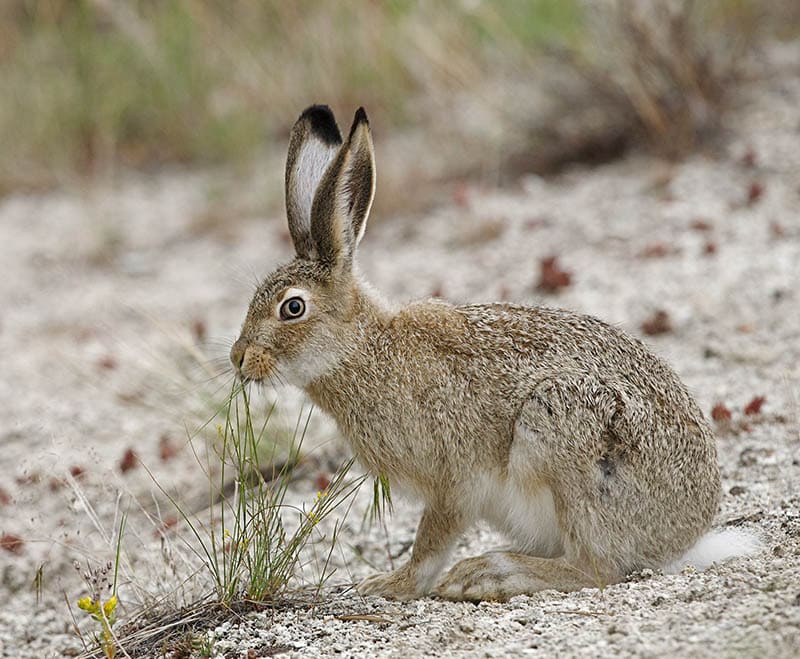
Can Rabbits Not Eat for a Day?
Absolutely not. Rabbits should always have a constant supply of food to avoid gastrointestinal stasis and other complications. Any period of food deprivation puts a rabbit at risk for life threatening gastrointestinal stasis and organ disorders which don’t necessarily go away when the rabbit eats again. Therefore, even if a rabbit can technically survive for a day without food, they may not live for much longer after that even if they are provided with food again. This is a serious welfare issue and will cause the rabbit to feel unwell and uncomfortable, and should always be avoided.
It’s important to monitor your rabbit’s food intake and behavior closely, and if you notice any changes in their appetite or behavior, it’s best to consult a veterinarian.
Conclusion
As grazers, rabbits have sensitive digestive systems that require them to eat small amounts of food constantly throughout the day. Rabbits should have access to hay continuously, and it is unacceptable to leave them for even just a few hours without food, but especially not 12 hours or longer.
If you notice that your rabbit is not eating, it is important to contact your veterinarian immediately. Loss of appetite in rabbits can be due to various reasons, and all cases require veterinary attention. There is only one exception to this rule.
The only situation in which your rabbit might have food withheld is when under direct vet supervision. For instance, if your rabbit is at the vets’ having a medical procedure or surgery on their mouth or teeth, your vet might fast them for just one hour. This way, there is no food in the mouth to block the view during the procedure. However, your vet will also give your rabbit intravenous fluids and adequate treatment to prevent dehydration or gut stasis and get them eating again right after their procedure. Otherwise, remember that your rabbit’s health and welfare relies on having a constant source of fresh food and water, and your rabbit should be nibbling and enjoying their food constantly.
Featured Image Credit: MrLeestudio, Shutterstock



